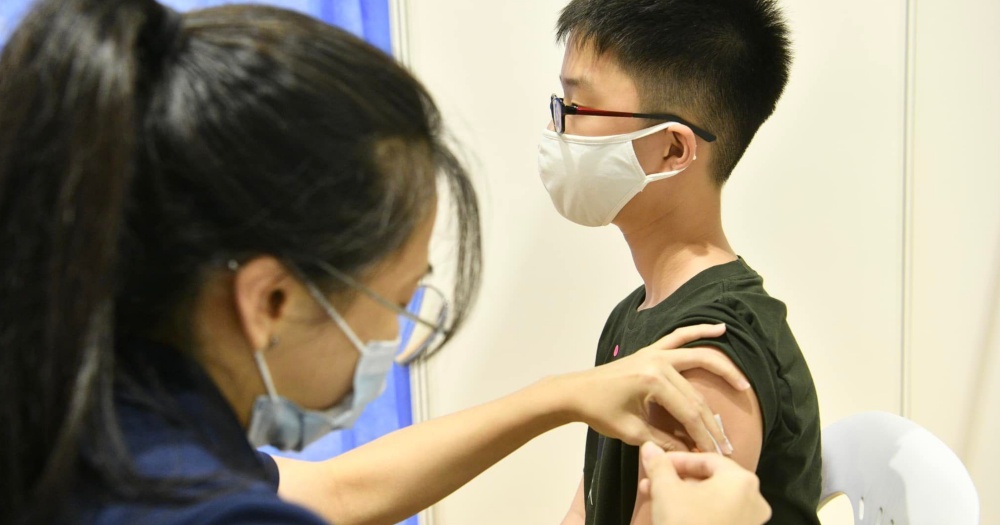Follow us on Telegram for the latest updates: https://t.me/mothershipsg
Covid-19 booster doses for children aged five to 11 will be made available in about two months' time, Senior Minister of State for Health Janil Puthucheary said in Parliament today (Aug. 1).
He acknowledged that a third mRNA dose of a Covid-19 vaccine may be necessary "at some point" to keep children's protection levels high, and said that MOH has made the necessary preparations for the vaccine booster rollout for this group.
Children below 5 years old to get vaccinated near the end of the year
At present, the Pfizer-BioNTech/Comirnaty vaccine remains the only vaccine authorised for use in children aged five to 17 years old in Singapore, said Puthucheary.
Children who are not medically eligible for the Pfizer-BioNTech/Comirnaty vaccine may receive the Sinovac-CoronaVac vaccine under a dedicated public health programme.
Moderna's Covid-19 vaccine for this age group, however, remains under evaluation, Puthucheary added.
Puthucheary noted that children under the age of five are currently the last group in Singapore not yet protected by vaccination.
He said MOH is preparing to start vaccination for those under five towards the fourth quarter of this year.
"The Health Sciences Authority (HSA) is currently reviewing the data submitted by Pfizer-BioNTech and Moderna on their Covid-19 vaccines for this age group. We will provide an update when an assessment of the quality, effectiveness and safety of the vaccines has been completed," said Puthucheary.
Children less prone to severe outcomes from Covid-19
In his speech, Puthucheary said he was saddened by the recent deaths of two young children from Covid-19 and offered his "deepest condolences to their families".
"Based on local and international data, the BA.4 and the BA.5 Omicron sub-variants have not been observed to affect children more severely than past variants, and severe Covid-19 infection continues to be rare in children, especially amongst those who are vaccinated," he said.
Currently, children under the age of five remain more vulnerable to Covid-19 infection and have higher rates of severe outcomes as compared to older children.
This is similar to other respiratory diseases, said Janil.
However, compared to adults and the elderly, the overall incidence of severe outcomes from Covid-19 infection "remains much lower" amongst children.
Children under three months will be admitted to hospital by default
Janil added that children who need medical attention should see a General Practitioner (GP) or a visit a polyclinic.
Children with acute respiratory infection (ARI) symptoms will be tested using an antigen rapid test (ART) by default, or a Polymerase Chain Reaction (PCR) test.
Children under three months of age will be admitted to the hospital by default, while older children will be treated under the Home Recovery Programme and reviewed by doctors via a telemedicine service, which is available around the clock.
Hospitals will continue to prioritise care for children with urgent medical conditions, and those who require further observation and treatment will be admitted, said Janil.
"MOH regularly reviews and updates the screening and review criteria with inputs from a panel of specialists," he added.
Use of oral antivirals for children under 18
Janil then responded to a question posed by Chua Chu Kang GRC Member of Parliament (MP) Zhulkarnain Abdul Rahim, who asked if MOH will consider approving the use of oral antivirals to treat toddlers or young children infected with Covid-19.
Janil said that oral antivirals are licensed for use for patients aged 18 and above only, under HSA's Pandemic Special Access Route.
For children aged between 12 to 18, local and overseas treatment guidelines indicate that Paxlovid, Pfizer's Covid-19 antiviral pill, may be considered on a case-by-case basis, said Janil.
"We will continue to review the evidence for the use of oral antivirals for children under 18 years of age," he added.
Top photo via Chan Chun Sing/FB.
If you like what you read, follow us on Facebook, Instagram, Twitter and Telegram to get the latest updates.
